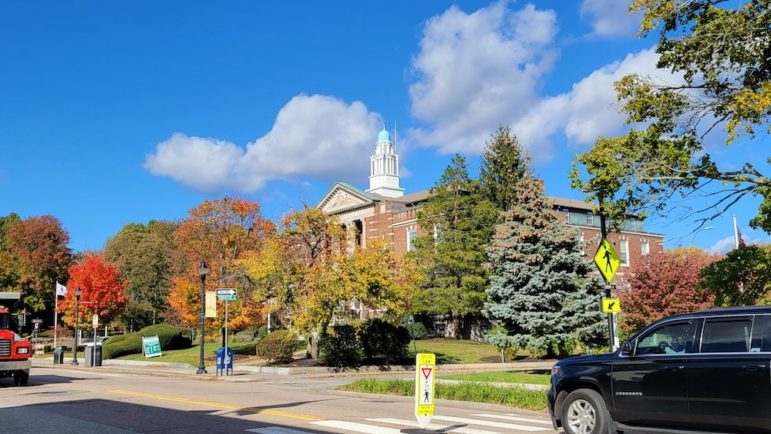
Photo by Charlie Breitrose Watertown City Hall
The City Council will be weighing in on a 39-page document that sets the rules for how Watertown’s appointed committees and municipal departments operate. Some changes proposed include changing the length of terms for some committees, who appoints members of certain committees, and how to remove members of committees.
The City has been working for many months with the Edward J. Collins, Jr. Center for Public Management at UMass Boston to create an Administrative Code for the City of Watertown, said City Manager George Proakis at the Sept. 23 Council meeting. He provided the Council with a draft Administrative Code, which he said is designed to “serve as a single, consolidated ordinance that outlines the structure and organization of city government that essentially covers boards and commissions and covers city departments.”
Among the proposed changes in the Administrative Code are establishing a three-year term of office on all committees, boards and commissions, called multi-member bodies in the Code. This would impact the Traffic Commission, the Affordable Housing Trust, the Memorialization Committee, and the Storm Water Advisory Committee; all of which have two-year terms.
“Seems like we’re always reappointing people to them,” Proakis said. “So it is recommended bringing them to three (year terms).”
The change would not impact two committees. The Zoning Board of Appeals has a five year term under State law, and the Board of Election Commissioners has four year terms under the Watertown City Charter.
Rules would be changed so that some committees currently not under the Council’s review in the current rules would be changed so they would be reviewed by the Council. The boards include the Bicycle & Pedestrian Committee, the Commission on Disability, the Council on Aging, and the Historical Commission.
The process for removing a member of an appointed body is specified in the Administrative Code. If a member of a multi-member body fails to attend regularly scheduled meetings for three consecutive months, or three consecutive meetings, whichever is longer, the proposed Code would deem the office vacated. Also, the City Manager, with the confirmation of the City Council, can remove a member of a multi-member body.
“This generated a lot of discussion internally, and I look forward to the opportunity discussing that more with the Council,” Proakis said. “I didn’t necessarily think it was right for the administrator to be able to just remove them without some sort of process, but right now, it’s silent on removal, and if somebody does something outrageously egregious, you just wait out their terms.”
The proposed code says that a subcommittee of a multi-member board be made up of members of that board.
“When you do that, it actually leaves one odd board out, which is the Biosafety Committee, which is currently a subcommittee of the Board of Health, which includes members who are not on the Board of Health,” Proakis said. “So it proposes bringing the Biosafety Committee into the process with Council approval for their members.”
The Code also proposed changing to whom the Community Preservation Committee’s staff person reports. Currently that position is supervised by members of the Community Preservation Committee, but the Code proposes that the CPC’s staff person join the Community Design Division of the City’s Department of Community Development and Planning.
Just a Draft
Proakis said the draft document is meant for the Councilors to read and provide comments, but not officially submit because that sets into motion a process with a strict deadline under state law.
“Once an Administrative Code is officially submitted by the manager, the plan becomes effective 90 days after submission, unless it’s disapproved by the Council. And, importantly, the Council may only vote to approve or reject the plan as a whole. It may not amend it,” Proakis said. “I want to make sure to accommodate for those procedural limitations and ensure I have meaningful input on this document. I’m providing this version as a draft for discussion, not as a submission.”
Proakis said he would like to review the structure and the provisions in the Administrative Code with the entire Council or a Council committee before he formally submits it.
“The one thing I can say with confidence, is that this document isn’t perfect, that there are some things that need feedback and discussion and change,” Proakis said. “The only way to do that is to submit the draft, have that conversation, get that feedback before submitting a version that is basically being submitted for an up or down vote.”
When the Administrative Code is approved, Proakis recommended that the Council repeal older ordinances. If they do not do so, future changes would have to be made in multiple places.
The Collins Center also reviewed Watertown’s Personnel Ordinance, which dates back to before Watertown transitioned from a Town Meeting form of government to the current City Council-City Manager style of government in the early 1980s.
“The ordinance that still is on the books refers to a personnel board that hasn’t existed for 40 years. It assigns responsibilities to a town moderator that has not existed for over 40 years,” Proakis said. “And based upon its review, the Collin Center is recommending repealing this ordinance in its entirety.”
City Council President Mark Sideris said he plans to schedule a special City Council meeting to discuss the Administrative Code, and asked councilors to go through this document before that time.
Former City Councilor Angeline Kounelis requested that the draft Administrative Code be made available for the public to view.
More information about the proposed Administrative Code, including a link to the draft, can be found at https://watertown-ma.gov/1558/Administrative-Code.